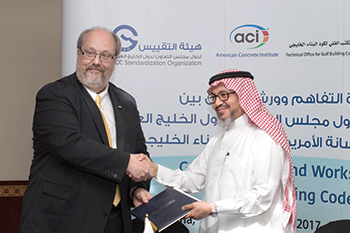ACI, GSO to draw up Gulf Building Code
01 December 2018
The American Concrete Institute (ACI) and Gulf Cooperation Council Standardisation Organisation (GSO) are working towards creating a Gulf Building Code that aims to advance the design of structural concrete.
This follows an agreement by the two authorities last year to cooperate towards a better understanding and use of concrete and cementitious materials in civil infrastructure.
Specifically, the agreement provides permission to utilise ACI’s Building Code Requirements for Structural Concrete (ACI 318), Specifications for Structural Concrete (ACI 301), and Building Code Requirements for Masonry Structures (ACI 530), to develop a Gulf Building Code.
Once the Gulf Building Code is published, ACI content modified to accommodate local conditions will be readily available to engineers, professors, students, and the governments of Bahrain, Kuwait, Oman, Qatar, Saudi Arabia, the UAE, and Yemen.
“Our global concrete community is strengthened by knowledge sharing and togetherness,” stated Ronald Burg, executive vice-president of ACI. “Combining ACI’s 100-plus years of consensus-based knowledge with the tremendous innovation occurring now in the Gulf region will accelerate us all toward the shared vision for a future where everyone has the knowledge needed to use concrete effectively. On behalf of the institute’s 30,000 student and professional members globally, I eagerly await the many fruits that will come from this strengthened relationship.”
GSO and ACI have also agreed to further expand their technical coordination through designation of official organisational representatives at technical seminars and symposia. GSO will encourage individuals involved in the concrete industry to attend ACI conventions, become active members of ACI committees, and participate in ACI’s many chapters in the Gulf region.
ACI is also becoming more active in the region’s activities focused on concrete design, construction, and materials, and is planning a January 2019 celebration for the opening of its Middle East Regional Office in the Dubai World Trade Centre.
On January 7, 2019, ACI will host a day-long training that will review the current edition of ACI 318, Building Code Requirements for Structural Concrete (ACI 318-14) and help attendees get acquainted with its organisation to quickly navigate the code requirements and demonstrate how to ensure that a design fully complies with ACI 318. Design examples will be used to demonstrate the use of the code and also introduce the ACI design requirements for use in seismic regions.
The training will be led by Randall Poston, ACI vice-president and past chair of ACI Committee 318, and Matthew Senecal, ACI director of Engineering. Attendees will have the opportunity to ask these experts in-depth questions about the building code requirements and see applications on how it is used in practice.
First published in 1941 as the Building Code Requirements for Structural Concrete, ACI 318 provides minimum requirements for the materials, design, construction, and strength evaluation of structural concrete members and systems.
Used by hundreds of thousands of concrete industry professionals since then, ACI 318 is currently available in inch-pound and Système international (SI) units, with versions in English, Chinese, Korean, and Spanish. ACI 318 is included in the current International Building Code, and is used by more than 30 countries directly adopting or referencing its provisions.
The rapid construction growth in the Gulf region has led to an increase in the use of ACI 318 and acknowledgement that ACI 318 Building Code Requirements for Structural Concrete is one of the most essential and valuable standards with respect to the design of reinforced concrete structures.
Additional information about the forthcoming Gulf Building Code, the day-long ACI 318 training, and the ACI Middle East Regional Office grand opening celebration can be found on www.concrete.org.
- Consultants sought for $4bn Bahrain-Saudi link
- Bahrain to build new private aviation terminal
- KBR wins expressway deal extension
- ACI, GSO to draw up Gulf Building Code
- Bahrain starts distribution of 5,000 homes
- Henkel’s Ceresit CN69 to meet market demand
- Terex boosts regional team for Genie
- Golden Gate towers get good response
- ACTS wins work at Kuwait airport
- Foundation stone laid for $13bn Madinat Al Irfan
- GlassPoint, Occidental set to develop 2GW Oman solar plant
- PDO awards contract for solar plant
- Work starts on $2bn waterfront project
- Marassi Al Bahrain selects contractor
- Acwa inks deal for $2.3bn Egypt project
- Mega VW showroom opens
- In Brief



